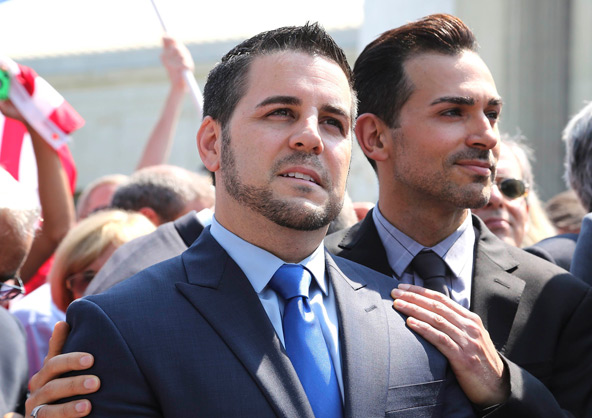
A divided U.S. Supreme Court ruled June 26 that the federal Defense of Marriage Act is unconstitutional. Catholic leaders both locally and around the country called the 5-4 ruling tragic.
A separate case that challenged California’s Prop 8 — a voter-approved measure that blocked same-sex marriage — was sent back to the lower courts.
Bishop Thomas J. Olmsted said the rulings on the two cases are evidence that the Court has “succumbed to our culture’s radical efforts to redefine marriage and, in a very real sense, is now engaged in the ongoing battle against families, society and people of faith.”
Ron Johnson, executive director of the Arizona Catholic Conference, said that while he was disappointed by the court’s ruling, there is a silver lining.
“Despite the tragic rulings today, we are at least fortunate that they did not create a federal definition under the U.S. Constitution to try to redefine marriage,” Johnson said, acknowledging that there is already talk buzzing around the state Capitol regarding a placing a constitutional amendment in favor of same-sex marriage on the 2014 ballot.
“The state marriage amendment — that still stands,” Johnson said regarding the 2008 decision by Arizona voters to amend the state constitution to define marriage. “We are absolutely going to need to defend that.”
Rick Garnett, professor of law and political science at Notre Dame University, said that the Supreme Court’s ruling does not mean that all states are going to have to adopt same-sex marriage — at least not yet anyway.
“A lot of the language in the opinion striking down the federal DOMA suggests to me — and I think to a lot of other people — that the majority of Justices are very sympathetic to the idea that the Constitution requires same-sex marriage,” Garnett said. In a couple of years, Garnett said, there could be even more support for same-sex marriage and more states that have legalized it. That, Garnett said, suggests that “in a few years that the court will take the step that it didn’t take today.”
Bishop Olmsted pointed to marriage as “so deeply embedded in our human nature that every culture in history has recognized it, and enshrined and protected it in law and custom.” The concept of marriage as being exclusively between one man and one woman, Bishop Olmsted said, “was not an idea created by these cultures but, rather, a truth received by them as something handed down from a higher authority.”
Cardinal Timothy Dolan of New York termed the ruling “a profound injustice.”
“The Court got it wrong,” Cardinal Dolan said. “The federal government ought to respect the truth that marriage is the union of one man and one woman, even where states fail to do so.”
Catholic leaders also responded to the charge that barring same-sex marriage is evidence of hatred or discrimination.
“It is important to point out that everyone deserves love and respect, including those who experience same-sex attraction,” Bishop Olmsted said. “But society is not served by marriage redefinition. Our children deserve the truth as instilled by one mother and one father in marriage as a family unit.”
Alan Sears, general counsel for the Alliance Defending Freedom, called the Court’s rulings “profoundly disappointing” and said that the decisions will not end the debate over marriage.
“Once the people examine all dimensions of the debate, and why marriage is important, we’re confident America will return to a strong and healthy marriage culture, recognizing that marriage is the institution upon which a healthy and thriving society is built,” Sears said.
In the meantime, Sears said, the Court’s rulings mean that “we will no longer have a national definition of marriage. The federal government may now be required to accept any legal definition of marriage that a particular state invents.”






